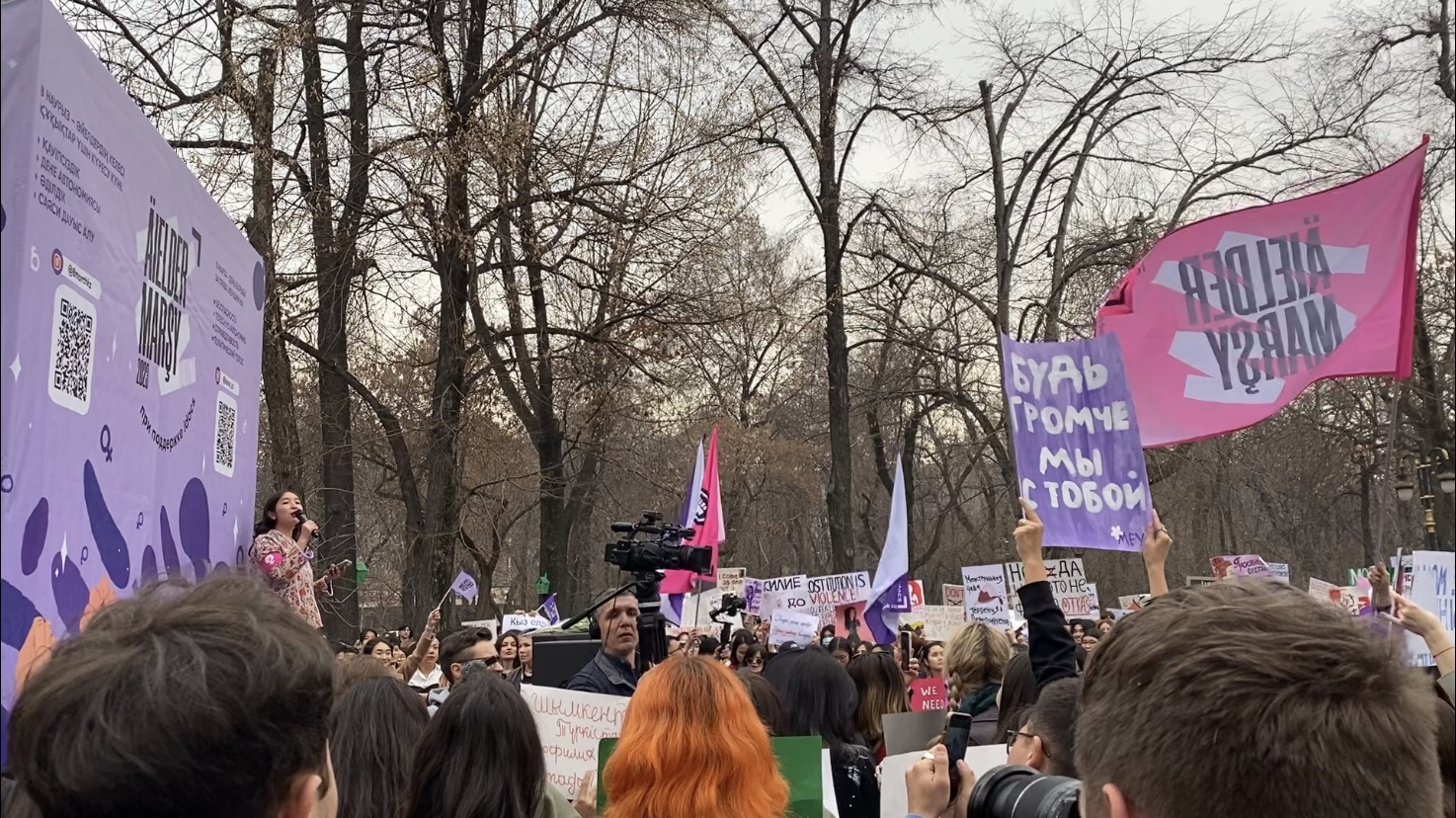This year’s high-profile murder trial against former minister Kuandyk Bishimbayev put the issue of domestic violence into the spotlight across Kazakhstan. In May 2024, Bishimbayev was found guilty of killing his wife Saltanat Nukenova and sentenced to 24 years in prison. The public outrage that accompanied the trial, sparked a debate on whether making the punishment harsher would curb domestic violence.
After being decriminalized in 2017 and up until the Bishimbayev trial, domestic violence was only considered an administrative offense. Now, critics fear that harsher laws might not lead to change in practice.
The incidence of domestic violence in Kazakhstan is alarmingly high. According to the ministry of internal affairs, in 2023 police received 99,026 complaints related to family violence, and courts sentenced 67,270 people to administrative penalties. Data from World Health Organization (WHO) in 2018 indicates that 16% of women in Kazakhstan have experienced some form of violence in their lifetime, whereas 6% encountered it in the previous year. Research by Friedrich Ebert Stiftung, a German political foundation, revealed that one in six children in Kazakhstan grows up witnessing domestic violence.
Anna Ryl is the head of an independent crisis center in Astana, which provides shelter for women and children who are victims of domestic violence. In an interview with International Partnership for Human Rights (IPHR), Ryl explained that police officers are one of the main obstacles to addressing domestic violence, especially when they attempt reconciliation.
“[Police officers] have very little experience, only three months of training, lack communication skills and do not apply a gender-sensitive approach, and often this gives rise to protecting men and [...] persuading a woman not to report. The police should not act as mediators, they should react and hold the abuser accountable, not interfere or put pressure on the victims.”
Ryl also highlighted the necessity of educating police and streamlining how law enforcement responds to victims of domestic violence.
“I believe that in order to improve the situation as a whole, we need training for district police officers, inspectors, we need to introduce requirements, and come up with a mandatory protocol of actions. The participation of civil society is also essential, because they uncover the underlying issues. In Kazakhstan, this is now the responsibility of state bodies, and this means that the woman does not receive satisfactory assistance.”
Beyond the responses after the crime has occurred, it would be crucial to understand the origin of the problem. Experts believe it comes from the objectification of women, and expectations of a woman’s role in society and in the family.
In Kazakhstan, opinions about women can be deeply rooted in a traditionalist mindset, limiting women’s opportunities and controlling them to a high degree. One example is the concept of ‘kelin’, the newlywed woman, who is expected to work in her in-laws’ home and can often be subjected to verbal harassment and disrespectful and abusive treatment. The concept is embedded in popular culture, for example in movies such as “The Kelinka Is Also Human”.
Independent human rights expert Tatiana Chernobil underscored the problematic societal expectations of women in Kazakhstan in a comment to media:
“In society, a woman can be a business owner, a public figure, an opinion leader, but more often than not, a woman is perceived not as an independent entity, but in relation to her role in the family.”
Thus, a woman’s value is defined according to her performance on the family stage. In 2022, Fariza Ospan from the FemAgora group said she believes that times are slowly changing for women, because she saw many refusing to become “domestic slaves”. Scientific research indicates that objectification of women leads to a higher risk of violence, partly because women are not always viewed and respected as equal to men.
Ryl sees similar issues in Kazakhstan.
“Women are still more often assigned a secondary role, and women are sexualised,” Ryl told IPHR.
Women are expected to be domestic caretakers, and their inability to live up to these expectations often becomes a driver of violence, Ryl argued.
But Ryl also believes that violence is rooted in interactions right from childhood, and must be addressed early on.
“It begins with how we treat children, when children are not looked after and slapping them becomes normal, as well as bullying in school, disrespectful attitudes from teachers, and educators in kindergartens, all this plays into how societal values are formed.
November 25 is the International Day for the Elimination of Violence against Women. On paper, Kazakhstan has made progress in protecting women from domestic violence. Kazakhstan ratified the UN Convention on the Elimination of All Forms of Discrimination against Women in 1998. Gender equality is embedded in Article 14 of Kazakhstan’s Constitution, which prohibits gender-based discrimination and Kazakhstan has a Gender Equality Strategy.
Bishimbayev’s trial led to other legislative changes, such as the so-called “Saltanat’s Law”, which introduced changes to the criminal code. For instance, police are now responsible for collecting evidence of a crime, whereas this used to be the responsibility of the victim. The changes also brought back criminal liability for battery and intentional infliction of light bodily harm against dependent family members.
If the woman is financially independent, however, things look different. Recently, an appeals court acquitted the former mayor in the western Atyrau region, who was charged with regularly beating his wife, because she earned her own income and was thus not financially dependent on him.
Unfortunately the latest legislative changes still do not go as far as to criminalize domestic violence in itself, leaving women expecting more decisive improvement in what too often directly affects their livelihood.
Alva Omarova is a researcher for International Partnership for Human Rights. IPHR is an independent, non-governmental organization founded in 2008. Based in Brussels, IPHR works closely together with civil society groups from different countries to raise human rights concerns at the international level and promote respect for the rights of vulnerable communities. See more at: https://www.iphronline.org/en/
Читайте этот материал на русском.
Поддержите журналистику, которой доверяют.








